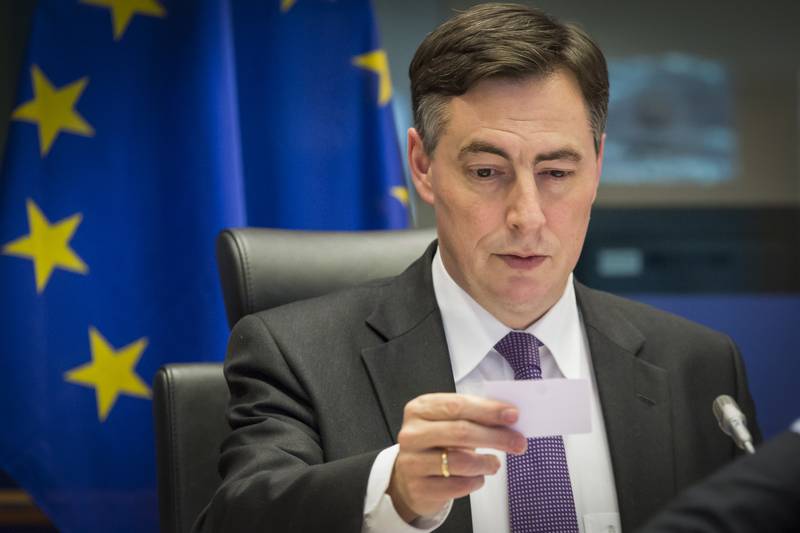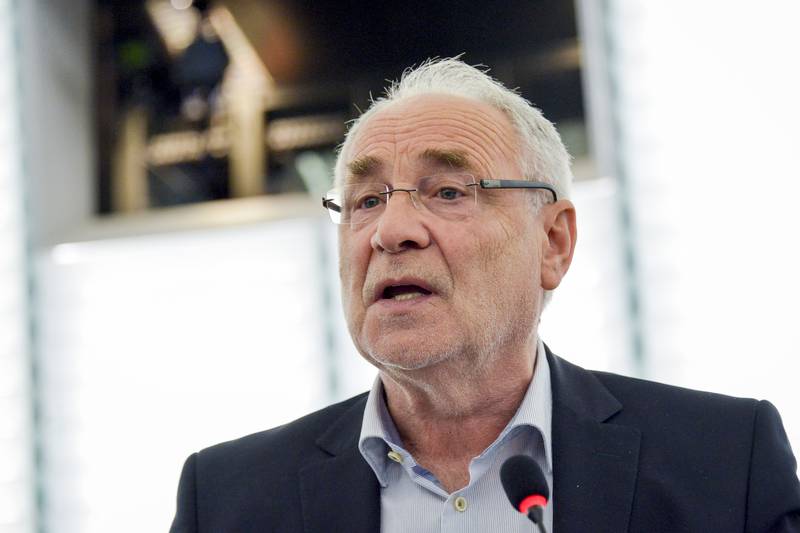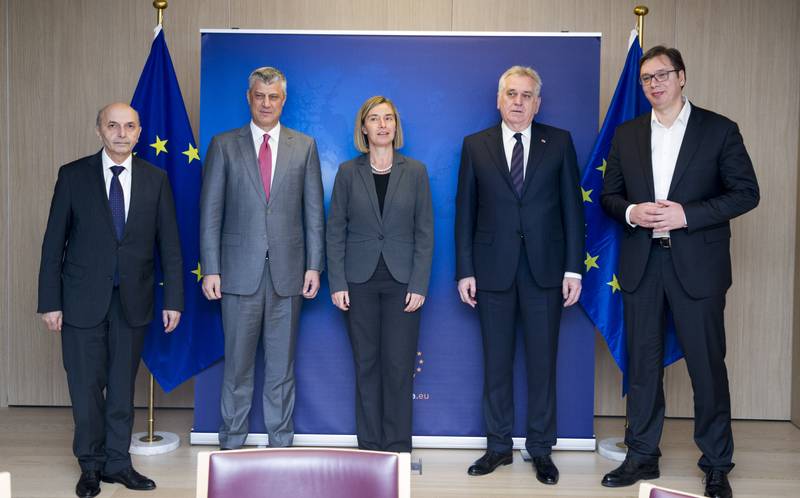There Is a Serious Crisis of Democracy in the Western Balkans Region
Adelina Marini, February 1, 2017
 A long delayed discussion took place in the European Parliament’s Foreign Affairs Committee about the tensions in the Western Balkans region, which have been growing for months now, but with the start of the new year the situation deteriorated dramatically. The discussion was initiated by the Slovenian MEP Ivo Vajgl (ALDE), who is the rapporteur for Macedonia, and was held on the day of the election of a new committee chairman. The former chairman, veteran of the European Parliament and Foreign Affairs Elmar Brok (EPP, Germany) conceded his post to another EPP MEP from Germany – David McAllister, who is the rapporteur for Serbia. A fact that was presented with a lot of hope by the Serbian media. During the hour-long debate the prevailing feeling was one of shared concern with the rising of tensions in the region, with just one differing opinion – that of the French nationalist Jean-Luc Schaffhauser of Marine Le Pen’s Europe of Nations and Freedom group.
A long delayed discussion took place in the European Parliament’s Foreign Affairs Committee about the tensions in the Western Balkans region, which have been growing for months now, but with the start of the new year the situation deteriorated dramatically. The discussion was initiated by the Slovenian MEP Ivo Vajgl (ALDE), who is the rapporteur for Macedonia, and was held on the day of the election of a new committee chairman. The former chairman, veteran of the European Parliament and Foreign Affairs Elmar Brok (EPP, Germany) conceded his post to another EPP MEP from Germany – David McAllister, who is the rapporteur for Serbia. A fact that was presented with a lot of hope by the Serbian media. During the hour-long debate the prevailing feeling was one of shared concern with the rising of tensions in the region, with just one differing opinion – that of the French nationalist Jean-Luc Schaffhauser of Marine Le Pen’s Europe of Nations and Freedom group.
The discussion was a very open and realistic analysis of events in the region. A thing that has long been missing at the European scene. According to David McAllister, the Western Balkans region needs to be a strategic priority for the EU, for the region is surrounded by EU member states and what goes on in it will have direct impact on the entire Union, especially in turbulent times. He read out a carefully prepared opening statement to the debate, in which he stated that the region is positioned in the heart of Europe. “In almost all countries are growing issues such as incomplete reconciliation, fragile inter-ethnic co-existence, threatening Islamic radicalisation, Russia's growing influence, insufficient political dialogue, a lack of media freedom and socio-economic problems”.
This realistic interlude was followed by pointing out of the hot spots, breeding tension in the region: the quarrel between Serbia and Kosovo because of the train issue; the post-election situation in Macedonia, growing ethnic polarisation in Bosnia and Herzegovina; claims about a coup attempt in Montenegro on Election Day and a possible manipulation by Russia. The Bosnia and Herzegovina rapporteur Cristian Dan Preda (EPP, Romania), who has long been warning about the Russian influence in the region, was even more straight-forward and direct. “The interest that we are taking can be explained by 2 factors: we need to recognise the fact that there are serious crises of democracy in the countries across the region. The electorate continues to be attracted by what is called ethno-nationalist policies and the ethnic divides are still being fomented for electoral purposes, and campaigns would suggest that nationalist rhetoric dominates debate”, he started off.
At the same time, he went on, Russia’s influence is growing throughout the region, and in Russia itself the nationalist ethnic dimension of politics has active participation. The Romanian MEP even thinks it dominates. He warned that there is a clear and present danger that the region is quite volatile at the moment and admitted to the EU being partly to blame for that. The former Croatian foreign minister, now MEP of the Socialists and Democrats group Tonino Picula described two opposite processes, which are currently underway in the Western Balkans: their gradual progress towards European integration and the spreading of interests and values, which contradict European integration and values. He believes that the dividing lines are most of all within certain countries of the region.
“The region’s progress is visible and undeniable, but it is not such, that it is immune to being threatened by a bad development, as we have been witnessing lately. Relations between Priština and Belgrade, as well as the situation in Macedonia and BiH too are not safe enough, so that we could not witness a serious deterioration of interstate relations, which will reflect on their European integration path as well”, concluded Mr Picula.

The initiator of the discussion, Ivo Vajgl, reminded that on the Balkans a conflict could burst into flame from a single little spark. “All conflicts in this region started with verbal aggression. Hate speech and insults we hear a lot of these things currently - in the media, television, in the newspapers as well and unfortunately very prominent political figures in these countries have these comments”, he said. He believes the words of the Serbian president on the hapless train from Belgrade to Kosovska Mitrovica are capable of provoking war. Word is of the reinstatement of the Belgrade-Kosovska Mitrovica railway line for the first time in 18 years, which was however played out in a very provocative way. The train was painted on the outside in the colours of the Serbian flag and all over it, written in 21 languages, there were the words “Kosovo is Serbia”. On the inside the train was pasted with photographs of frescoes from the Eastern Orthodox monastery in Kosovo.
Due to the sharp escalation of tension the train was halted before it entered Kosovo, but let loose some militaristic rhetoric. The candidate for a second presidential term Tomislav Nikolić threatened that, if need be, he will send the military into Kosovo to protect the Serbian minority there.
The rapporteur for Kosovo Ulrike Lunacek (Greens, Austria) urged the countries of the region to concentrate on European values. “One of the essences of the enlargement process and what has made this EU strong is overcoming nationalist threats that brought to Europe in the last century the most ferocious wars we had”, she said and expressed her concern that the election of Donald Trump as president of the United States lends serious support to radical nationalists. She sees a solution to the problem in more television programmes and history textbooks, as well as in the ceasing of the politics of hate and violence.
French MEP Jean-Luc Schaffhauser, however, was outraged at this type of speaking and asked whether among European values one should also consider the recognition of Kosovo, which he named “a mafia state”. This caused some verbal discourse in the committee and forced Chairman McAllister’s warning that such attitude is inappropriate. “Please, let’s treat all European states with the same respect”, called David McAllister.
The debate was dominated by Croatian and Slovenian MEPs. Dubravka Šuica (EPP, Croatia), who got elected Vice-Chairperson of the committee, believes that the problem of the region is the conformism of leaders in those countries. “It is a fact that authoritarian tendencies and looking up at Russia present a great danger in these territories. There are authoritarian tendencies in existence, if we speak about the freedom of media in some states. Moreover, until we, as the EU, do not show willpower that we are ready to monitor political processes, the region will witness a further regress of democracy. The EU must be present much more actively in the region”, was her appeal. She believes that recent events are simply provocations, meant for domestic use and it is not likely that it will get to anything more serious, but only under the condition that the EU is more actively present in the region.
Tanja Fajon (S&D, Slovenia) warned that the region suffers from growing nationalism and brain drain. Jozo Radoš (ALDE, Croatia) reminded that, according to Serbia, the halting of the train was the provocation, not sending it. The president of Serbia stated that he was ready to go to war with Kosovo, just as he did in Croatia, reminded the MEP. “Also, the EU has not been able to resolve problems in Macedonia for a whole decade. We have representatives of Kosovo going to Albania for consultations. So, we don’t seem to be able to resolve the issues we are faced with. It seems that the political will is insufficient. Are we about to phase a new division of spheres of interest in the Western Balkans as we had in Yalta, just that we do not have the wisdom of Winston Churchill anymore”, further said Jozo Radoš.
Alojz Peterle (EPP, Slovenia), who used to be Slovenia’s prime minister just at the time of its separation from former Yugoslavia, stated that the European context has changed significantly since the time of the declarations of Zagreb in the year 2000 and Thessalonнki of 2003. “The question is whether we are satisfied with what is happening from one year to another”, he asked and requested a strong debate with the participation of the High Representative of the European Union for Foreign Affairs and Security Policy Federica Mogherini (Italy, S&D) and the Commissioner for Enlargement Negotiations Johannes Hahn (Austria, EPP). Romanian MEP Victor Boştinaru (S&D) explained the situation with the enlargement fatigue.
“The Western Balkans have been and will probably always be, if Europe is not wise to act, a place of confrontation among major international actors”, he said and called for EU member states of the region to have more active participation in the integration of their neighbours. “If we continue with less effective steps than other countries, I'm referring to Russia, to China and Turkey they will be there”, warned the Romanian MEP. Another Croatian MEP – Marijana Petir (EPP) – criticised the EU’s approach towards the Western Balkans. She believes it is not pro-active and, besides, double standards are being used. She gave Macedonia as an example, which had fulfilled all prerequisites for membership, but was left in the waiting room over the last 10 years. Petir called all member states to begin EU membership negotiations with Macedonia.
“At the same time, we seem to have a rather favourable approach when it comes to Serbia, irrespectively of Serbia's continuous proofs that it is not respecting the EU values”, added the Croatian MEP.
On the same day as this debate was happening in the Foreign Affairs committee of the European Parliament, another round of the dialogue between Serbia and Kosovo took place at the highest level, in which on the Serbian side participated the Prime Minister Aleksandar Vučić and President Tomislav Nikolić, and on the Kosovo side – President Hashim Thaçi and Prime Minister Isa Mustafa. Nikolić’s rhetoric remained unchanged even after that meeting, however. The next meeting of such rank is scheduled for Wednesday (February 1st). Meanwhile, the Croatian daily newspaper Jutarnji list published an interview [in Croatian language] with former Montenegro Prime Minister Milo Đukanović, in which he warns that the Balkans may be described as a potential source of tension, due to the extremely tense  relations between the East and the West. “This could have catastrophic consequences for the region, especially keeping in mind that more and more countries are ethnically unstable and their once clear European perspective has become quite obscure in recent years".
relations between the East and the West. “This could have catastrophic consequences for the region, especially keeping in mind that more and more countries are ethnically unstable and their once clear European perspective has become quite obscure in recent years".
Đukanović also said that the agreement in the region, brought about by the Dayton peace accord no longer exists. “Some remnants of the pre-Dayton crises, which were supposed to be eliminated, have remained intact; several new ones have appeared, like the blocking of Macedonia’s road to integration. And now the perspective of the entire region looks quite worse and there are alternative ideas appearing already – generally already seen and proved false”, continues the former prime minister of Montenegro. He does, however, believe that the responsibility for the current state of affairs in the Western Balkans does not belong only to the international community, but also to the people living in the region. “In life, I do not like situations where I have no alternatives, but this is how it is with the Balkans. The Balkans, sadly, have no instruments of their own for self-stabilisation. If we are to reach stability – and instability with us throughout history has always meant war – we need to create these instruments by entering a community of democratic, socially and economically more advanced countries than us”, is Milo Đukanović’s recipe.
Translated by Stanimir Stoev
 Bakir Izetbegovic, Andrej Plenkovic | © Council of the EU
Bakir Izetbegovic, Andrej Plenkovic | © Council of the EU Aleksandar Vucic, Recep Tayyip Erdogan | © Serbian Presidency
Aleksandar Vucic, Recep Tayyip Erdogan | © Serbian Presidency Jean-Claude Juncker, Zoran Zaev | © European Commission
Jean-Claude Juncker, Zoran Zaev | © European Commission